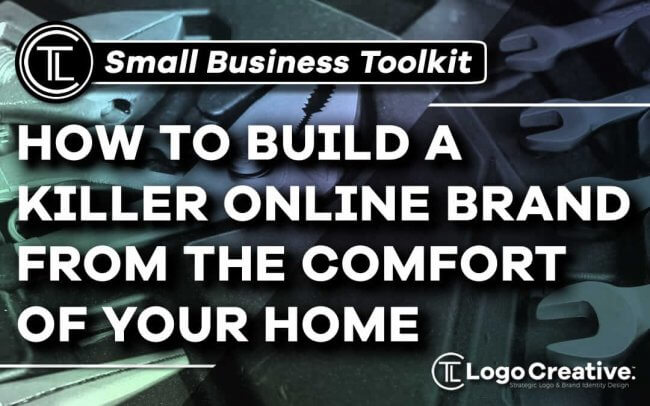Check out the Small Business Toolkit: How To Build A Killer Online Brand From The Comfort Of Your Home.
There was a time when the measure of a business lay in the ground covered by the owner (and I’m not talking about figurative ground). Success lies in networking and negotiation. If you aimed to achieve greatness, you’d need to meet as many relevant professionals as possible: investors, advisors, suppliers, partners, and anyone else who could support operational growth.
Staying at home was only for those who’d put in the miles and established strong teams to represent them.
Things are rather different now, of course. The arrival of the internet as a mainstream utility changed everything, and the pandemic outbreak made it abundantly clear that most typical business tasks can be done remotely if needed.
This doesn’t just apply to work put into existing brands: it also applies to work done to create new brands altogether.
Yes, it’s true: you can indeed build a killer online brand from the comfort of your home, never needing any conventional meetings or even a substantial budget. And in this post we’re going to offer up some core tips for how you can make it happen.
Let’s get started.
Table of Contents
Register and Populate a Suitable Domain
SEO / search engine optimization is a mission-critical part of running an online business. Most purchases or brand investigations start with Google searches: if your website doesn’t appear prominently when someone searches for one of its key terms, it’ll go completely unnoticed.
Notably, though, search performance isn’t something you can earn in a day. It’s something you gather up through years of diligent research and effort.
The first step in that process is registering and populating a website domain, and it’s the first thing you should do here. As soon as you know what your business is going to be called, look for domains that might work, register your preference, and put something active at that address.
Provided you regularly post updates, it can even be a filler page explaining that a full website is in development. The point is to show Google that the domain is active, even at an early stage: the longer the domain is active, the more trustworthy it will seem.
Investigate Existing Brands in Your Niche
As your domain matures, you can take a closer look at what other companies in your niche are doing (Buffer has a good guide to competitor analysis). Visit their websites, check out their social media profiles, read up on their PR activities, and sample their products and/or services.
This process of collecting information is invaluable because it gives you the insight you need to make your brand stand out. You otherwise run the risk of trying to do what’s already being done.
You needn’t take this to the point of being contrarian, though. Zigging when everyone else is zagging can work out well, but sometimes everyone is zagging because zagging is simply what’s required.
The more you investigate, the more you’ll come to understand which typical brand expectations must be met and which can usefully be subverted.
Produce a Complete Set of Brand Guidelines
With a lot of research in your back pocket, you can proceed to producing a complete set of brand guidelines. These guidelines will require various creative assets, including a set of logo variants, a flexible colour scheme, a couple of fonts, any other visual rules you want to define (visual consistency is highly important, after all), a slogan, and a tone of voice you want to stick to.
The more you can define in your guidelines, the easier future brand work will be.
Consider that you won’t always be able to produce all the work for your brand. Whether you hire a team of full-time employees or farm work out to freelancers, you’ll need those people to know how to match your previous work, and brand guidelines will make that so much easier.
Brands only become memorable when they’re consistent not just visually, but in every regard. If you fall into irregularity, your company will be written off as unpredictable.
Carefully Select Your Software Foundation
Building and maintaining an online brand requires the extensive use of varied software, whether you’re hosting a store, creating visual assets, ideating content, finding and reaching influencers, or tracking ad campaign performance.
If you’re going to thrive, you’ll need to choose your software foundation very carefully. Producing your visual assets in Microsoft Paint isn’t the best idea, for instance — while Photoshop may be overkill depending on your requirements.
The biggest thing to get right is the foundation of your website, particularly if you’re running an ecommerce business. The CMS behind an online store impacts everything from how quickly its pages load to how customisable the checkout process is.
You can pick a free CMS and do all the work yourself, pay for a hosted solution, or split the difference by opting for a freemium platform like Prestashop. There’s no one-size-fits-all option, so you’ll simply need to read plenty of reviews, factor in your specific needs, and make the best call you can in the situation.
Seeking Guidance From Relevant Online Communities
Lastly, no matter how quickly you pick up the basics of running a small business, you’re going to encounter things you don’t understand. When this happens, you can panic, or you can seek paid help — but you needn’t do either of those things if you simply take advantage of the many online communities out there catering to ambitious entrepreneurs.
Look around for forums relevant to your chosen niche. Entering ecommerce? Look for other budding merchants. Trying the fashion business? There are plenty of sartorial discussions to be found.
Reddit is a good place to start. You will need to get involved if you want people to help you in the long run (it’s ultimately a value exchange), but helping others will form valuable connections that will further assist you down the line. It’s a win-win arrangement.
Join The Logo Community
We hope this Small Business Toolkit: How To Build A Killer Online Brand From The Comfort Of Your Home. If you would like more personal tips, advice, insights, and access to our community threads and other goodies, join me in our community.
You can comment directly on the posts and have a discussion with Andrew, the Founder of The Logo Creative.
*TIP – We recommend Freelance Level Up Kit by Kady Sandel, It’s for graphic designers who have the foundations of their business but want to grow, raise their prices, and sign more (and better!) clients.
 Author Bio
Author Bio
Rodney Laws is an ecommerce platform specialist & online business consultant. Worked in the eCommerce industry for two decades, helping brands achieve their goals. Get his advice by visiting EcommercePlatforms.io and reading his detailed reviews


